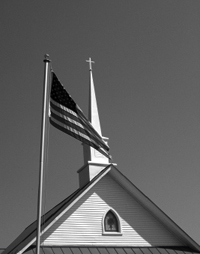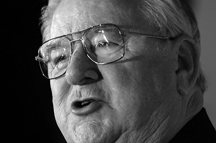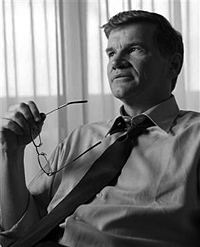OldSpeak
The Passing of the Christian Right
By John W. Whitehead
February 4, 2008
"Nearly 30 years after religious conservatives decided to reenter the political arena—after abandoning it as 'dirty' and leading to compromise—what do they have to show for it? The country remains sharply divided and the reconciling message they used to preach has been obscured by the crass pursuit of the golden ring of political power. In the end, they got neither the power, nor the Kingdom; only the glory, and even that is now fading as these older leaders pass from the scene."—Cal Thomas, former vice president of the Moral Majority
We are witnessing the end of an era. The deaths of Jerry Falwell (May 15, 2007) and Dr. D. James Kennedy (September 5, 2007) augured a decided downward shift in the Christian Right's steady march to power. Yet long before these men were laid to rest, the movement they helped energize had begun its steady decline.
 In the early 1980s, an emergent generation of evangelists lit up television screens, appeared on university campuses, and infiltrated syndicated radio waves. Among these leaders were Falwell, Kennedy, James Dobson, and Pat Robertson, evangelical figures who both predicted and embodied the formation of a new political religion that has transformed the national political scene.
In the early 1980s, an emergent generation of evangelists lit up television screens, appeared on university campuses, and infiltrated syndicated radio waves. Among these leaders were Falwell, Kennedy, James Dobson, and Pat Robertson, evangelical figures who both predicted and embodied the formation of a new political religion that has transformed the national political scene.
While this marriage between the Religious Right and the political right has been in the making for nearly three decades, the union was consummated with George W. Bush's rise to power and resulted in the Christian Right's enjoyment of unprecedented political influence. As Falwell remarked in 2004: "For conservative people of faith, voting for principle this year means voting for the re-election of George W. Bush…. I believe it is the responsibility of every political conservative, every evangelical Christian, every pro-life Catholic, every traditional Jew, every Reagan Democrat, and everyone in between to get serious about re-electing President Bush."
In fact, those of the Christian Right have made no effort to hide their intentions to impact the political scene in the halls of Congress. Falwell, Dobson, and others laid great store on their contacts inside the Bush White House. As Falwell once remarked, "Everyone takes our calls." However, the Christian Right's claim of political influence may be supercilious. David Kuo, in his book Tempting Faith: An Inside Story of Political Seduction (2006), argues that Christian Right leaders are nothing more than politically inept tools used by politicians to advance their own agendas.
Kuo, who served as Special Assistant to President George W. Bush, noted that evangelical leaders were often invited to White House functions in an effort to curry their favor and garner their support. Conference calls were held in the White House to update Christian leaders. According to Kuo, talking points were distributed and advice was solicited from these Christian leaders and others. But "that advice rarely went much further than the conference call." And "the true purpose of these calls was to keep prominent social conservatives and their groups or audiences happy." As Kuo recognized, the political establishment just wanted access to the evangelical voting base.
Unfortunately, there is always a price to be paid for power and prestige. In the process of seeking policy outcomes and funding for faith-based initiatives, Christian activists were seduced by political power to such an extent that the gospel of Jesus Christ has been held hostage to a political agenda. Whereas Christianity was once synonymous with charity, compassion, and love for one's neighbor, today it is more often equated with partisan politics, anti-homosexual rhetoric, affluent megachurches, and moralistic finger-pointing.
 |
|
Jerry Falwell, 1933-2007
|
In fact, the Christian Right has been painted as the "American Taliban." In his book American Fascists: The Christian Right and the War on America (2006), Pulitzer Prize-winning journalist and former war correspondent Chris Hedges contends that today's Christian Right resembles the early fascist movements in Italy and Germany that emerged at the beginning of the twentieth century. And no wonder he makes such a comment! The Christian Right has used religion like a sledgehammer to beat down its opponents. For example, shortly following the 9/11 terrorist attacks, Jerry Falwell appeared on televangelist Pat Robertson's television show, The 700 Club. The attacks, Falwell said, were evidence that God was angry at America for its cultural immorality and the nation was paying the price for it. Falwell laid the blame on certain individuals and groups such as the ACLU for "throwing God out successfully with the help of the federal court system, throwing God out of the public square, out of the schools," as well as pagans, abortionists, feminists, gays, and lesbians.
The answer proffered is to take control of the government. In fact, Gary Potter, president of Catholics for Christian Political Action, advocates: "After the Christian majority takes control, pluralism will be seen as immoral and evil and the state will not permit anybody the right to practice evil." Such rhetoric has contributed to a genuine but growing backlash against the Christian Right that can be seen in the popularity of Chris Hitchens' book god is not Great: How Religion Poisons Everything (2007).
Indeed, as President Bush's political star has waned, the Religious Right's legacy and its ability to positively impact the nation are increasingly being called into question. Critics contend that the evangelical movement has been largely reduced to political impotence and moral irrelevance.
By many indications, since the rise of the Christian Right in the early 1980s, the moral condition of the country has worsened. Several years ago, a Barna Group study found that the American adults surveyed found the following, among other things, "morally acceptable": gambling (61 percent), cohabitation (60 percent), and sexual fantasies (59 percent). Nearly half of the adult population felt that two other behaviors were morally acceptable: having an abortion (45 percent) and having a sexual relationship with someone of the opposite sex other than their spouse (42 percent). And the younger the age group surveyed, the more these types of activities were deemed morally acceptable.
As the study concludes, "The generational data patterns make a compelling case for this ongoing slide. Even most people associated with the Christian faith do not seem to have embraced biblical moral standards. Things are likely to get worse before they get better—and they are not likely to get better unless strong and appealing moral leadership emerges to challenge and redirect people's thoughts and behavior. At the moment, such leadership is absent."
 |
|
Ted Haggard
|
The high-profile scandal in the fall of 2006 involving Ted Haggard, who at the time was president of the National Association of Evangelicals (NAE), underscores the crisis in modern Christianity. For example, Haggard used his position as head of NAE to advocate various Christian Right platforms in condemning homosexuality and campaigning for amendments banning same sex marriage. However, he was forced to resign as pastor of his megachurch and president of NAE when it was discovered that he was involved in sexual immorality with a homosexual.
The real tragedy of the Ted Haggard debacle was not that Haggard had been leading a double life. As David Kuo remarked to the Associated Press, "It's tragedy enough if a pastor fails, but this is not about a pastor failing. This is about a politician failing, and the politician is bringing Jesus down with him."
Yet all is not lost. There is a growing sense among many Christians that politics cannot provide the fulfillment they are seeking. After all, by its very nature, politics is driven toward division, compromise, deceit, and, inevitably, corruption. Perhaps people are finally starting to wake up to this truth. According to Kuo, while evangelicals aren't flocking to the Democratic Party, they are perhaps turning away from politics as a means of moral engagement and fulfillment. His prediction is sustained by one post-election online survey of more than 2,000 people, which revealed that "nearly 40 percent of evangelicals support the idea of a two-year Christian 'fast' from intense political activism."
D. James Kennedy was, perhaps, keen to this shift. As a leading figure in the Christian Right and Republican Party politics, Kennedy's televised messages had strayed from traditional preaching to focusing primarily on politics and social issues. However, in April 2007, shortly before his death, Kennedy announced that he was shutting down the Center for Reclaiming America and his Center for Christian Statesmanship in Washington, D.C. He intended to return to his ministerial roots.
The Christian Right should follow suit. Unlike many Christians today, Christ did not engage in politics, identify with the government, or attempt to push an agenda through government channels. In fact, for Christians to be stridently aligned with conservative politics is to miss the point of their religion. "One of the greatest injustices we do to our young people is to ask them to be conservative," theologian Francis Schaeffer wrote. Conservatism, as such, means promoting a political agenda and, thus, maintaining the flow of the status quo. True Christians, however, should be revolutionaries against a status quo dedicated to materialism and the survival of the fittest. Indeed, Christians should stand outside the status quo. This includes politics. We often forget that Christ spoke truth to power and made it abundantly clear that His kingdom was not of this world.
Unfortunately, all too often Christians wrap their religion in the flag, so to speak. For the Christian, country and faith are never synonymous, and they are not two equal loyalties. As Francis Schaeffer noted, "It must be taught that patriotic loyalty must not be identified with Christianity." As Christians in past regimes have found, identifying with the establishment, as much of modern evangelicalism is doing, can present a grave danger—the establishment can and often has become the church's enemy.
Not only is it perilous to identify with the established powers, it also negates the true mission of the church. The church is not to identify with power but to speak truth to power—even at great costs. Martyrs, past and present, testify to this.
Thus, if Christianity is to serve as the moral compass of society, Christians must remain clear of the constraints and compromises entailed in political affiliation. The most appropriate role of religion in politics lies in its ability to define moral issues and speak truth to power. The voice of moral authority, enabled and enhanced by its spiritual roots and raised without dependence upon the legitimacy of the state, will always be the highest expression of true freedom. Such a voice denies the ultimate authority of the government to create or define right or wrong by its own power.
All this does not mean that the church has to be silent. This is definitely not a day for a sleeping church. While Christians should avoid politicizing their religion, this does not mean that pastors or individuals should not address the pressing social and moral issues of the day. Just the opposite is true. Christians need to be clear in what they say and stand by it.
Most of all, there is a dire need for a compassionate Christianity. Like the early church, the modern church needs to cut across all lines and reach out to every segment of society. If not, irrelevance will become its epitaph.
DISCLAIMER: THE VIEWS AND OPINIONS EXPRESSED IN OLDSPEAK ARE NOT NECESSARILY THOSE OF THE RUTHERFORD INSTITUTE.


